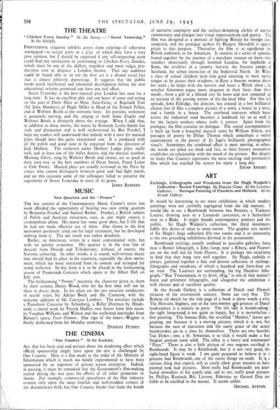"Our Country." At the Academy.
THE CINEMA
Au. that has been said and written about the deadening effect which official sponsorship might have upon the arts is challenged by Our Country. Here is a film made to the order of the Ministry of Information which is much too boldly experimental to have been sponsored by an exponent of private screen enterprise. Indeed, in passing, it must be remarked that the Government's film-making record during the war puts the efforts of all other promoters to shame. For example, commercial speculators of the film industry .venture only upon the more familiar and well-trodden corners of the documentary field, but Our Country breaks free from the bonds of narrative continuity and the surface-skimming clichés of normal commentary and plunges into visual impressionism and poetry. The film was designed as a portrait of fighting Britain for foreign con- sumption, and the prologue spoken by Burgess Meredith is appro- priate to that purpose. Thereafter the film is as significant for British audiences as for American. It consists of 2, series of episodes bound together by the journey of a merchant seaman on leave who wanders observantly through bombed London, the hopfields of Kent, the revelries of a country harvest, the forestry camps of Scotland, the urban intensities of the Industrial North. In Wales a class of school children wish him good morning in their native tongue as he passes their windows, in Kent a buxom woman darns his socks ; he helps with the harvest and hears a Welsh choir ; he watches fishermen argue, more eloquent in their faces than their words ; from a girl in a blitzed city he hears and sees conjured up an account of the passing terrors of the the local blitz. For this last episode, John Eldridge, the director, has created in a few brilliantly chosen feet of film a complete picture of a town, a house in a town, and a family in a house. The overhead conveyer which loops across the industrial road becomes, a landinark for us as well as for the factory workers whose roofs it crosses. Apart from the prologue, the film contains no dialogue. The sound accompaniment is built up from a beautiful musical score by William Alwyn, and passages of poetry by Dylan Thomas which contribute a verbal counterpoint to the poetry of Jo Jago's brilliantly photographed visuals. Sometimes the combined effect is most moving, at others the words are piled too thick and fast, or their literary association establishes no relationship with the mood of the picture. But despite its faults Our Country represents the most exciting and provocative film which has reached the screen for -many a long day.
EDGAR ANSTEY.


























 Previous page
Previous page